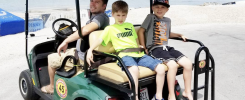As a mom of a child on the Autism spectrum and another with un-diagnosed but suspected SPD/ADHD, life is sometimes completely chaotic at home. I know this is because my kids “hold it together” all day at school and then can finally be themselves at home but it is still extremely stressful at times. Since October is ADHD Awareness Month I was offered a book to review called “The Sensory Child Gets Organized” that promised to share “proven systems for rigid, anxious, or distracted kids” and was skeptical at first but so far I’m learning a lot from it.
In the book the author, Carolyn Dalgliesh, provides simple, effective solutions that help kids thrive at home and in their day-to-day activities and helps parents:
- Understand what makes their sensory child tick
- Create harmonious spaces through sensory organizing
- Use structure and routines to connect with their child
- Prepare their child for social and school experiences
- Make travel a successful and fun-filled journey
With The Sensory Child Gets Organized, parents get an easy-to-follow road map to success that makes life easier—and more fun—for your entire family. I like how the book includes picture examples of schedules and spaces along with writing space for parents working through the book. There are also some great resources in the back of the book.
Here are a few tips that I’ve learned so far and plan on implementing with my kids:
1) Arrive at birthday parties (or any event where there will be a lot of people) early so the kids can have some time to get comfortable with the location in a small group before there is a large crowd
2) When thinking about the upcoming holiday events make a “must do” list for your sensory child. Consider letting them skip events so they can have a little downtime and enjoy the events you really want them to go to.
3) Organize feelings by having the child rate where they are on a scale of 1 to 10 (with words or pictures). Jacob seems to get just as upset about tiny things as he does about big things so I want to start having him rate his feelings so he can start to realize when he is “just a little” mad vs. “really” mad and learn to react accordingly.
4) Build flexibility one small step at a time. One example was to create a “choices when there is a change” jar that can be used when something in their schedule changes. If something gets cancelled and they are very upset they can pick an alternative activity that they love doing that will make the activity getting cancelled a little easier for them.
I’m looking forward to reading the rest of the book. If you have a child with some sensory processing difficulties I thing this book will be beneficial in helping you create the best home environment for your kiddo as possible.
(Disclosure: I received this book for free but all thoughts are my own.)


















